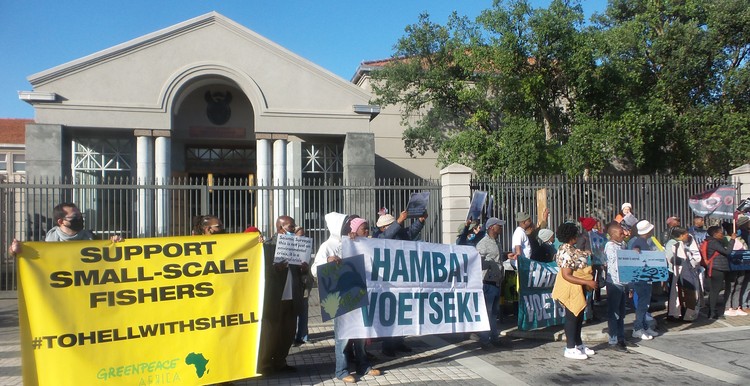Wild Coast: Constitutional Court says no to Shell appeal bid
But way is open for Shell to apply for another renewal of seismic survey permit
Activists picket outside the High Court in Gqeberha in 2022 against seismic surveys off the Wild Coast. Archive photo: Joseph Chirume
- The Constitutional Court has refused to hear an appeal by Shell and Impact Africa on the right to conduct seismic surveys off the Wild Coast.
- The Supreme Court of Appeal had found that the right to conduct the surveys was granted unlawfully.
- However the Constitutional Court agreed to hear from Wild Coast communities and environmental justice organisations who also want to challenge the SCA’s decision.
- This opens the way for Shell to to apply to the Minister of Mineral Resources and Energy to renew the controversial permit.
The Constitutional Court has refused to hear an appeal by Shell and Impact Africa against a ruling by the Supreme Court of Appeal (SCA) that the right to conduct seismic surveys off the Wild Coast was granted unlawfully.
However, the court has agreed to hear from Wild Coast communities who want to challenge the SCA’s further ruling, giving Shell an opportunity to apply to the Minister of Mineral Resources and Energy to renew the controversial permit for a third time.
The Wild Coast communities and environmental justice organisations Sustaining the Wild Coast, All Rise Attorneys, Natural Justice and Greenpeace Africa, have said Shell should not be given an opportunity to make up for their failed consultation process when it applied for the right over a decade ago.
They argue that the law does not allow such a late correction.
The Constitutional Court, in granting them leave to appeal, has agreed to hear these arguments and has issued directions regarding the filing of further papers.
In refusing Shell and Impact’s application for leave to appeal, the Constitutional Court said there were no prospects of success.
The litigation began in the Makhanda High Court which found that the exploration right had been granted unlawfully because affected communities had not been properly notified and consulted.
The court found that the communities’ right to food and livelihoods from the ocean and their spiritual and cultural rights, as well as the climate change impacts, had been ignored.
The court also found that the Minister had failed to consider and comply with the requirements of the Integrated Coastal Management Act. It set aside the exploration right entirely.
The SCA, in hearing what became the failed appeal by Shell and the Minister, agreed with these findings. But the court said it would be “too harsh” to set aside the exploration right aside immediately and instead suspended the order of invalidity pending the outcome of a third renewal application by Shell (which it lodged in 2023)
The Wild Coast communities say this was wrong. They say the SCA order did not protect the right of communities and other parties to fair administrative action. It also failed to give clarity on what Shell and the Minister must do to remedy the defects in the earlier process “which means that, inevitably, more litigation will follow”.
In an affidavit, Delme Cupido, Southern Africa Hub Director of Natural Justice also speaking for Greenpeace Africa, described the suspension of the invalidity as “extraordinary relief” which came as a “complete surprise” because none of the parties had asked for it and it had not been canvassed at the hearing.
He said the order was not a constitutionally compliant “effective remedy”, because it was “wholly unclear what must be done and by whom to give effect to further public participation”.
He said the statutory regime precluded public participation in the renewal process and there was a broader public interest in obtaining clarity on such orders.
The Constitutional Court has yet to set a date for hearing the application.
Support independent journalism
Donate using Payfast

Don't miss out on the latest news
We respect your privacy, and promise we won't spam you.
Next: Judge guilty of misconduct, but gets away with slap on the wrist
Previous: Eastern Cape school kept results from matriculant because she owed the school money
© 2024 GroundUp. This article is licensed under a Creative Commons Attribution-NoDerivatives 4.0 International License.
You may republish this article, so long as you credit the authors and GroundUp, and do not change the text. Please include a link back to the original article.
We put an invisible pixel in the article so that we can count traffic to republishers. All analytics tools are solely on our servers. We do not give our logs to any third party. Logs are deleted after two weeks. We do not use any IP address identifying information except to count regional traffic. We are solely interested in counting hits, not tracking users. If you republish, please do not delete the invisible pixel.

